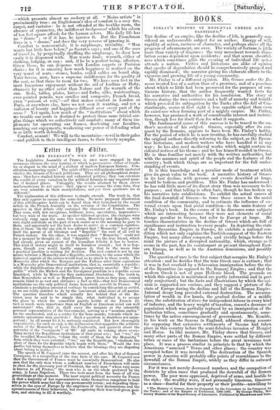tfttrt to t4t Chin.
THE PENELOPE'S WEB OF FRANCE.
The Legislative Assembly of France is once more engaged in that strenuous idleness the very naming of which is provocative either of laugh- ter or disgust to the mind of a student of modern European history. Con- stitution-mongering, again! The spirit of Sieyes still animates with unabated vitality the breasts of French politicians. They are all philosophical states- men: they have studied history and exhausted politics; they can calculate the results of every variation m the political formula to any required num- ber of decimal places. Unhappily, the results attained by these clever mathematicians do not agree : they appear to assume the same data, they are very scientific in their manipulations, and ) et their quotients are so different !
The explanation of this difference is simple enough. The truth is, that they only appear to assume the same data. No more pregnant illustration of this self-deceptive habit can be found than that furnished by the recent debate in the French Assembly on the revision of the Constitution. The speeches in that debate ably sustained the character of French oratory. They were, with few exceptions, brilliant, terse, speculative, impressive— but very wide of the mark. As speaker followed speaker, the changes were variously rung upon the same two words, Monarchy and Republic, with very slight solicitude on the part of each orator as to the meaning he gave to them, and apparently not the least desire to arrive at a common significa- tion of them. On the one side it was affirmed that "Monarchy" had proved itself the parent of all blessings and "Republic" the root of all evil in French history. On the other, it was argued that "Monarchy" could not for a moment be thought of; that "Republic" was the true friend, which had already given an earnest of the boundless felicity it has to bestow. This kind of oratory might in itself be harmless enough; but it so hap- pens, though you would hardly suppose it, that in the mean time a practical question is waiting for decision. The real contest is not by any means between a Monarchy and a Republic, according to the sense which the historical appeals of the orators would lead us to attach to these words. The Monarchy after which the Berryers and the Falloux utter their aspirations is a Monarchy plus Democratical institutions, that is, essentially a republic ; while the Republicanism they repudiate is sanguinary anarchy. The " Re- public " which the Michels and the Cavaignacs proclaim is a republic minus bloodshed, while by Monarchy they understand Absolutism. The truth is, that Monarchists as well as Republicans, ignore facts as they may, cannot remain blind to so vast and obtrusive a fact as this—that free Democratical institutions are the only political forms henceforth possible in France. We eliminate a prodigious amount of verbiage by considering this point as settled, as we are really entitled to do by the concurrent admi-sions of all parties. The question therefore which actually lies behind that of the Re- vision may be said to be simply this, what individual is to occupy the place to which the somewhat puerile habits of the French at- tach so much more importance than an English or American mind can well understand? who, that is, shall carry the insignia as the ostensible personal representative of the Government, serving as a " nominis umbra" for the uneducated, and as a centre for the beau monde, towards which in- definite splendours may gravitate ? Such a question is doubtless not unim- portant ; by all means let it be seriously considered. But how thoroughly unproductive, for such an end, is the deliberation that magnifies the achieve- ments of the Monarchy of Louis the Fourteenth, and quarrels about the paternity of the "conquests" of '89! All unite in valuing above every- thing mortal the Republican institutions of that great sera; but "we," say the so-called Monarchists, "claim the credit of them for the Monarchy' from which they were extorted; "we," say the Republicans' "vindicate the glory of them for the Republic which began with them." Would the two parties but bring themselves to believe that the blessings they are disputing about belong to neither ! The speech of M. Coguerel came the nearest, and after his that of General Cavaig,nac, to a recognition of the true facts of the case. M. Coquerel sees that the Government of France must be essentially Democratical. He also sees that the only man whom a sufficient number of Frenchmen will unite to elect for the necessary post of President, the only man "whose very name is known to all France, the man who is on the whole preferred by the army, is Louis Napoleon. These two facts must form the basis of all wise proceedings at this moment. The most urgent political necessity for France is that a majority of her representatives make themselves competent to hold the 'power which none but they can permanently retain ; not degrading them.. selves in the eyes of Europe by the emptiness of their declamations and the uproariousness of their behaviour, but recognizing their true God-given pad- tton, and striving to fill it worthily.


























 Previous page
Previous page